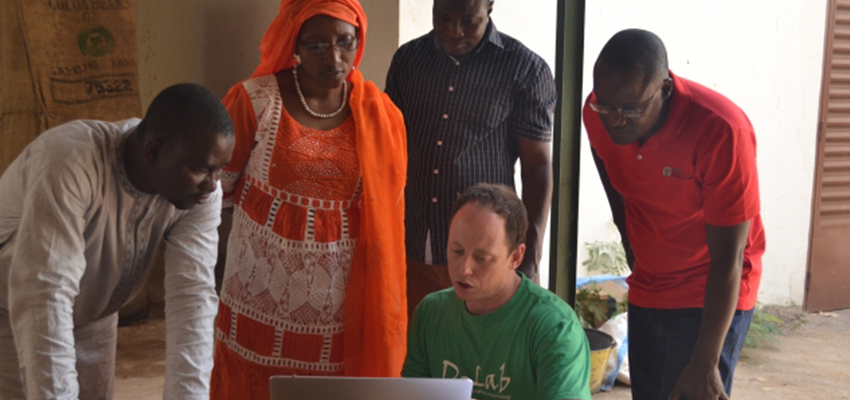
MIT's Comprehensive Initiative on Technology Evaluation announces its latest product evaluations and global partnerships.
MIT researchers launch technology evaluations for global development in Mali, India - Full Article
The Comprehensive Initiative on Technology Evaluation (CITE) at MIT has announced its 2017 product evaluations.
Over the next year, the interdisciplinary program will bring together faculty, staff, and students from across MIT to evaluate two new product families — vegetable cooling and storage technology, and food packaging — and to kick off a new collaboration to better understand decision support for post-harvest storage technologies.
CITE, which is based in the MIT Department of Urban Studies and Planning, was created in 2012 with support from the United States Agency for International Development’s (USAID) Higher Education Solutions Network. It is a pioneering program dedicated to developing methodologies for product evaluation globally.
CITE works closely with various partners — including Mercy Corps, the World Vegetable Center, the Self Employed Women’s Association, United Cerebral Palsy, and the Human Engineering Research Labs at the University of Pittsburgh — to identify technologies that could benefit from rigorous evaluation. CITE evaluates products through extensive lab and field testing, producing reports intended to help facilitate data-driven decision-making in global development.
“We are particularly excited this year to see a move to partner-led evaluation. In this way, CITE’s approach is being embedded within and adapted to other organizational needs, building capacity for evaluation in a more effective and sustainable way,” said CITE Associate Director Joanne Mathias.
Evaluating vegetable cooling and storage technologies in Mali
In partnership with MIT D-Lab, the World Vegetable Center, and Mercy Corps, CITE will evaluate vegetable storage technologies in Mali designed to function without the use of electricity where power is either not accessible or not affordable. Effective technologies will be able to prevent additional food loss and strengthen the supply chain for perishable foods, working to improve both the incomes of farmers and the food security of rural areas.
CITE will focus on measuring the technical capabilities of these storage receptacles through sensor data, as well as conducting interviews and examining the cost effectiveness of each option.
Evaluating food packaging options in India
The Self Employed Women’s Association Rudi Project is working with CITE in India to evaluate packaging technology for spices and pulses, with a focus on packaging that is environmentally-friendly, cost-effective, and capable of extending the shelf-life of their products.
CITE’s role includes advising on research methodologies, assisting in developing a research plan, liaising with MIT faculty, staff, and students, as well as aiding in the purchase of packaging technologies and interviewing manufacturers.
Understanding decision support for post-harvest loss
An increasing number of organizations in sub-Saharan Africa are looking to tackle the challenges of post-harvest loss. One-third of the world’s available food either spoils or gets thrown away, which can be mitigated by better storage technologies, as well as more efficient supply chains for delivery of produce.
Drawing on its past work in post-harvest storage, CITE’s newest post-harvest project aims to understand how operational decisions used by programs in Tanzania, working to identify the most effective means of reducing post-harvest loss, are made. This project is being jointly led by the Global Knowledge Initiative and CITE.
Ongoing evaluations
In addition to CITE’s new evaluations, researchers continue to advance the program’s evaluation of wheelchairs in Indonesia and solar pumps in India initiated last year.
CITE’s wheelchair evaluation, in coordination with the United Cerebral Palsy's Consolidating Logistics for Assistive Technology Supply and Provision (CLASP) Project, the International Society of Wheelchair Professionals, and the Human Engineering Research Labs at the University of Pittsburgh, is examining the technical performance of eight wheelchairs distributed in Indonesia, hoping to find the optimal and most cost-efficient solution toward a better quality of life for wheelchair users. CITE’s solar pump evaluation has expanded beyond last year’s comparative study of pumps and business models to take a close look at the solar panels that power these technologies.
Engaging the next generation of development practitioners
MIT undergraduate, graduate, and PhD students play a critical role in the CITE program, shaping its research agenda and leading implementation of CITE evaluation studies. Over the past four years, CITE has facilitated global research experiences for 54 MIT students in places such as Djibouti, Ethiopia, India, Mexico, Uganda and the Philippines. The CITE program has also led to the creation of eight additional courses at MIT.
“Working with CITE has emphasized to me the complexity of engaging with international development research. Students, funding sources, agencies, and partners need to coordinate for things to happen on the ground. CITE has helped me realize that there are no quick fixes to challenges in international development; several agencies and stakeholders must be on board and involved for an extended period of time,” said Sydney Beasley, a former CITE research assistant and master's student in city planning and the Technology and Policy Program.

